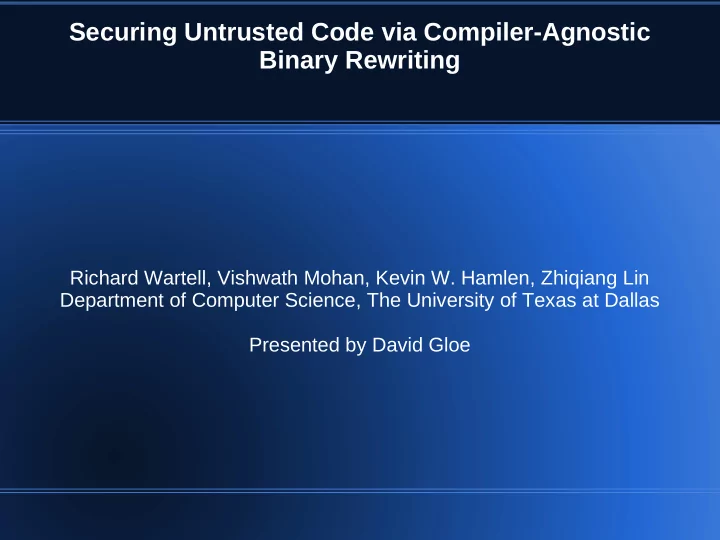

Securing Untrusted Code via Compiler-Agnostic Binary Rewriting Richard Wartell, Vishwath Mohan, Kevin W. Hamlen, Zhiqiang Lin Department of Computer Science, The University of Texas at Dallas Presented by David Gloe
Outline ● Introduction ● Background ● Design ● Implementation ● Evaluation ● Discussion ● Related Work ● Conclusion
Introduction ● Software is often distributed as a binary ● Binaries cannot always be trusted ● Two existing approaches to protection: – Virtual Machines (VMs) – Binary Rewriting ● SFI (PittSFIeld, Native Client) ● CFI (MoCFI)
Virtual Machines ● Pros – No need for disassembly – Calculate jump targets during runtime – Filter API calls with a security policy – Damage contained within VM ● Cons – Significant Overhead – Difficult to formally verify
Binary Rewriting ● Pros – No security hardware, software, or VMs needed – Better performance than virtual machines – Safety can be machine-verified ● Cons – Require cooperation from code producers ● PittSFIeld: gcc-produced assembly ● Native Client: Use of special compiler – Little motivation for producers
Proposed Solution ● REINS: CISC rewriting and in-lining system – Binary Rewriting – Requires no input from code producers – Redirects API calls through a trusted library – Jumps are protected by guard code – Verifier certifies rewritten binaries are safe
Background ● Assumes Windows, x86, and only binary ● Does not protect code from itself ● Binary must be run at user level ● Defender can modify code before execution ● Statically determining unsafe jump targets is an undecidable problem
System Overview 1) Binary sent through disassembler, generating a control-flow policy 2) Binary rewriting using control-flow policy 3) Rewritten binary verified with trusted verifier 4) Safe binary linked with the policy enforcement library 5) Binary can now be run safely
Design: Rewriting ● Rewriting uses SFI based on PittSFIeld chunks ● Partition into low memory and high memory ● Call instructions placed at the end of chunks ● Jumps referencing Import Address Table are unguarded ● Jump target table used for indirect jumps
Jump Target Table ● Disassembler finds superset of jump targets ● Each old target is replaced with a tagged pointer to its new location – Pointers are identified by the illegal hlt opcode (0xF4) ● False positives merely increase binary size ● False negatives are caught by the verifier
Jump Target Table Example ● Assume [r] contains 0xF41234 1) Compare [r] against 0xF4; it matches 2) Move actual address [r+1]=0x1234 into r 3) Sandbox r by ANDing with the bitmask 4) Jump to actual address 0x1234
Code Transformations call/jmp r cmp byte ptr [r], 0xF4 cmovz r, [r+1] and r, (d - c) call/jmp r ret and [esp], (d - c) ret mov rm, [IAT:n] mov rm, offset tramp_n jmp [IAT:n] tramp_n: and [esp], (d – c) jmp [IAT:n]
Design: Memory Safety ● Low memory non-code sections marked as non-executable (NX) by rewriter ● API calls which can unset NX are wrapped ● Untrusted self-modifying code is rejected
Design: Verifier ● Verifier is the only trusted component – Executable sections are in low memory – Exported symbols target low memory chunks – No disassembled instruction crosses a chunk – Static branches reference chunks – Computed jumps are masked – Jumps using the IAT access an IAT entry – No trap instructions
Implementation ● Prototype for 32 bit Windows XP/Vista/7/8 ● Rewriter ● Verifier ● API Hooking Utility – Replaces some IAT entries with trusted funcs ● Intermediary Library – Replaces standard kernel32 library
Evaluation ● Median results for COTS applications – 100% executable file size increase – 41% code size increase – 15% process size increase – 4.1 seconds binary rewriting time – 49 milliseconds verification time – 2.4% runtime increase (some decreased) ● Maximum 15% runtime increase
Policy Enforcement Library ● Libraries are automatically created through policy specifications ● Example: disallow sending emails – function conn = ws2_32::connect(SOCKET, struct ∗ sockaddr_in , int) −> int; – event e1 = conn(_, { sin_port=25}, _) −> 0;
Case Studies ● Email Client Eureka – Prohibits creating executables and executing explorer ● DOSBox Emulator – Prohibited access to portions of the file system ● Normal behavior unaffected, policies enforced ● Various Malware – All rejected during rewriting or runtime
Discussion ● Does not enforce Control Flow Integrity (CFI) – System call policies help ● Assumes jump targets are not dense – Each jump target must be one byte more than the word size apart from the next target – This is fairly rare ● Relies on classification of code and data – Inaccurate classification results in corruption
Classification of Code and Data ● “Differentiating code from data in x86 binaries” by Wartell et. al. ● General disassembly is impossible – Reduces to halting problem for x86 ● Instruction reference array maps opcodes to instruction lengths ● Utility function estimates likelihood of transition from code to data, or data to code
Related Work ● Source-level SFI – Rely on cooperation from code producers ● Binary-level SFI – Dynamic approaches have performance issues – Static approaches still require code producer input ● System-level – Cannot block attacks between modules
Conclusion ● REINS monitors and restricts API calls of untrusted x86 binaries ● Requires no source or debugging information ● Behavior-preserving for many COTS binaries ● Enforcement entirely on user level ● Median runtime overhead of only 2.4% ● Process size increase of only 15%
Questions? Securing Untrusted Code via Compiler-Agnostic Binary Rewriting Richard Wartell, Vishwath Mohan, Kevin W. Hamlen, Zhiqiang Lin Department of Computer Science, The University of Texas at Dallas Presented by David Gloe
Recommend
More recommend